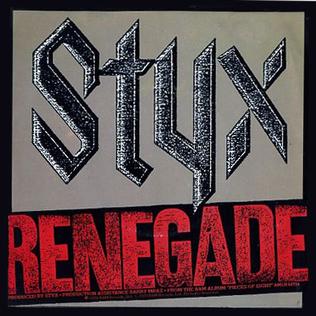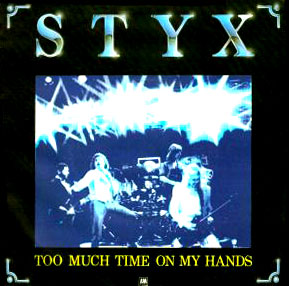
Styx is an American rock band formed in Chicago, Illinois, in 1972. They are known for blending melodic hard rock guitar with acoustic guitar, synthesizers mixed with acoustic piano, upbeat tracks with power ballads, and incorporating elements of international musical theatre. The band established themselves with a progressive rock sound during the 1970s, and began to incorporate pop rock and soft rock elements in the 1980s.

Edge of the Century is the twelfth studio album by Styx, released in 1990 on A&M Records. It was the first Styx album featuring A&M solo artist Glen Burtnik and the final album to feature drummer John Panozzo before his death in 1996. It is also their final album to be released on A&M Records.

"Mr. Roboto" is a song by American rock band Styx, released as the lead single from their eleventh studio album, Kilroy Was Here (1983). It was written by band member Dennis DeYoung. In Canada, it went to number one on the RPM national singles chart. It entered on both the US Billboard Hot 100 and US Cash Box Top 100 on February 12, 1983. On April 30, the song peaked at number three on Billboard, but fared better on Cash Box, where it reached number one.

Cornerstone is the ninth studio album by the American rock band Styx, released in 1979. Styx's third straight multi-platinum selling album, Cornerstone was Styx's first album to earn a Grammy nomination, which was for Best Rock Performance by a Duo or Group. Like the four previous Styx albums, the band produced the album themselves. Styx recorded the album at Pumpkin Studios in Oak Lawn, Illinois.

Kilroy Was Here is the eleventh studio album by the American rock band Styx, released on February 22, 1983. A concept album and rock opera about a world where rock music is outlawed, it is named after a famous World War II graffiti tag, "Kilroy was here." It was the last album of original material to be released by the "classic" lineup of Dennis DeYoung, Tommy Shaw, James "J.Y." Young, John Panozzo, and Chuck Panozzo.

Caught in the Act is a live double album by Styx, released in 1984. It contains one new song, "Music Time," which was released as a single, reaching #40 on the Billboard Hot 100 charts.

"Renegade" is a 1979 hit song recorded by the American rock band Styx on their eighth studio album, Pieces of Eight.

"Lady" is a 1973 power ballad written and performed by the rock band Styx. It was first released on Styx II and was a local hit in the band's native Chicago, but initially failed to chart nationally. The song gained success shortly after Styx left Wooden Nickel Records to move to A&M Records in 1974 as it began picking up airplay nationwide, eventually peaking at #6 on the Billboard Hot 100 in March 1975. The power ballad was later re-recorded for the 1995 Styx compilation Greatest Hits due to a contractual dispute between A&M and Wooden Nickel.

"Babe" is a song by the American rock band Styx. It was the lead single from the band's 1979 triple-platinum album Cornerstone. The song was Styx's first, and only, US number-one single, spending two weeks at No. 1 in December 1979, serving as the penultimate number-one single of the 1970s. "Babe" also went to No. 9 on the Adult Contemporary chart. It additionally held the number-one spot for six weeks on the Canadian RPM national singles chart, charting in December 1979 and becoming the opening chart-topper of the 1980s. It was also the band's only UK Top 40 hit, peaking at No. 6. It also reached No. 1 in South Africa.

"Don't Let It End" is the third track and the second top 10 single on the 1983 album Kilroy Was Here, by Styx. The song is also reprised at the end of the album.

"Lorelei" is a song from rock band Styx. It is on their 1975 album Equinox, and was released as a single in 1976.

"Mademoiselle" is the first single released from Styx's Crystal Ball album. The B-side, "Lonely Child", was taken from the previous album, Equinox. It peaked at #36 on the Billboard magazine Hot 100 singles chart the week of December 25, 1976, becoming Styx's third top 40 hit. It also reached number 25 on the Canadian RPM singles chart on the week of January 22, 1977.

"Fooling Yourself (The Angry Young Man)" is the second single released from Styx's The Grand Illusion (1977) album. On the Billboard Hot 100 pop chart in the U.S., the single peaked at #29 in April 1978. It also hit no. 20 on the Canada RPM Top Singles chart the week of May 6, 1978.

"Blue Collar Man (Long Nights)" is a song by American rock band Styx, released as the first single from their eighth studio album, Pieces of Eight (1978). Released in 1978, the single came in two 7" vinyl formats: one with the b-side "Superstars" (a track from The Grand Illusion) and a second single with the instrumental album track "Aku-Aku" as the b-side. Some printings of the single were also issued in a translucent blue vinyl, which are now highly sought after collectors items.

"Sing for the Day'" is the second single that Styx released from their album Pieces of Eight. It reached #41 on the U.S. Billboard Hot 100 pop singles chart in February 1979. It was later the B-side of their next single “Renegade”. Tommy Shaw used the name ‘Hannah’ in the song, to represent his fans. Several years later, he named his newborn daughter Hannah. The album version that lasts 4:57, was edited down to 3:40 for the single version.

"Why Me" is a song written by Dennis DeYoung that was first released on Styx's 1979 double-platinum album Cornerstone. It was also released as the second single from the album, and reached #26 on the Billboard Hot 100 and #10 on the Canada RPM Top 100 Singles chart.

"The Best of Times" is a song by American rock band Styx, released as the first single from their tenth album Paradise Theatre. It reached No. 1 in Canada on the RPM national singles chart, their second chart-topper in that country, and No. 3 on the US Billboard Hot 100 for four weeks in March and April 1981. In the UK, the song peaked at No. 42 on the UK Singles Chart.

"Too Much Time on My Hands" is a song by American rock band Styx, released as the second single from their tenth album Paradise Theatre. It was written and sung by Tommy Shaw, who also plays the lead guitar solo during the break in the song. It was Shaw's only top 10 single as a writer and vocalist with Styx.
"Music Time" is the sole studio track released on the live Styx album, Caught in the Act. It peaked at number 40 on the US Billboard Hot 100 chart the week of June 2, 1984.
"Love Is the Ritual" is the first single released from Edge of the Century by Styx.

















